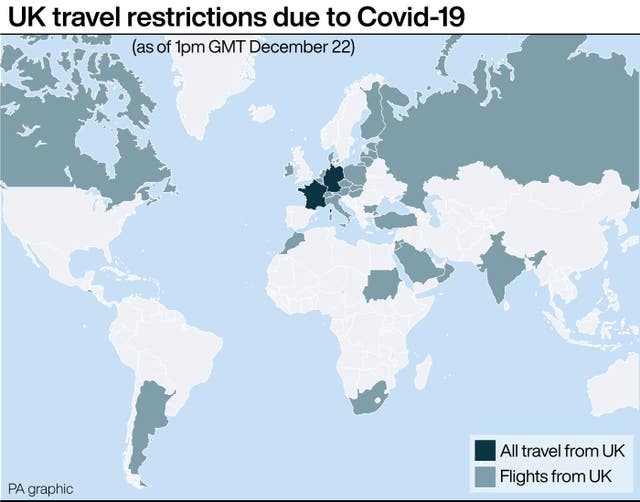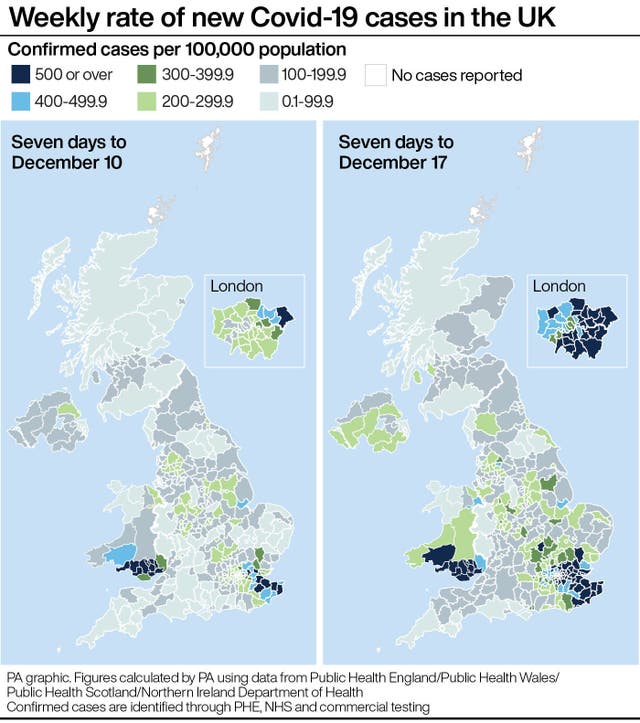
Henry Riley 7pm - 10pm
22 December 2020, 21:24

Planes, ferries and Eurostar services to France will be allowed to resume on Wednesday.
French authorities have announced that journeys from the UK will be allowed to resume on Wednesday after the coronavirus ban was lifted, but those seeking to travel must have a negative test result.
The conditions may do little to ease congestion in Kent caused by the French decision to stop hauliers using the Channel crossing.
It is thought that UK authorities will use rapid lateral flow tests to test lorry drivers to help get freight moving again.
Transport Secretary Grant Shapps urged lorry drivers not to head to the county in the hope of boarding a ferry or train.
The travel ban was imposed in response to fears about the spread of the more infectious coronavirus strain, which is spreading in the UK.
#COVID19 : "Planes, boats and Eurostar trains will resume service as of tomorrow morning. French nationals, people living in France and those with a legitimate reason will have to be carrying a negative test" – French Minister Delegate for Transport: https://t.co/WWdzbczNP7
— French Embassy UK (@FranceintheUK) December 22, 2020
In a press release, the French foreign affairs ministry said that from 11pm UK time (midnight in France) there would be a “limited resumption of the movement of people from the United Kingdom to France subject to negative health tests sensitive to the variant”.
The statement said that a negative test result, taken less than 72 hours before the journey, is required and this can be either a “PCR or antigen test” sensitive to the new variant.
Those who can make journeys include French and EU residents, British or third-party nationals who normally live in France or the EU, as well as some other groups.
French transport minister Jean-Baptiste Djebarri said: “Planes, boats and Eurostar trains will resume service as of tomorrow morning.
“French nationals, people living in France and those with a legitimate reason will have to be carrying a negative test.”
Mr Shapps tweeted: “Good progress today and agreement with the French Government on borders.
“We will provide an update on hauliers later this evening, but hauliers must still NOT travel to Kent this evening.”
Good progress today and agreement with the French Government on borders. We will provide an update on hauliers later this evening, but hauliers must still NOT travel to Kent this evening.
— Rt Hon Grant Shapps MP (@grantshapps) December 22, 2020
More than 2,800 HGVs were stuck in Kent on Tuesday afternoon as a result of the disruption.
The French decision to ease its restrictions came after the European Commission recommended a joint approach from EU members in response to the mutant VUI 202012/1 coronavirus.
The EU-wide approach recommended by the commission would allow essential travel, and transit of passengers should be facilitated.
Flight and train bans “should be discontinued given the need to ensure essential travel and avoid supply chain disruptions”, the commission said.
🔵 Recommendation by @EU_Commission to ensure coordinated approach to 🇬🇧 travel restrictions:
➡️Non-essential travel discouraged, but transit should be facilitated.➡️Flight & train bans should stop: need to avoid supply chain disruption. https://t.co/4oSbI7MbCo #coronavirus pic.twitter.com/hLLKTxruOD
— Daniel Ferrie 🇪🇺 (@DanielFerrie) December 22, 2020
EU justice commissioner Didier Reynders said: “Member states should take co-ordinated action to discourage non-essential travel between the UK and the EU.”
But “at the same time, blanket travel bans should not prevent thousands of EU and UK citizens from returning to their homes”.
Transport commissioner Adina Valean said: “Within the EU, it is crucial that transport workers are exempted from any restrictive measures.”
The EU’s recommendation suggested rapid tests should be used to avoid disruption to cargo flows.
Despite the European Commission recommendations, Ireland extended restrictions on travel from Great Britain until December 31 which ban passenger flights and sea crossings.
The situation at the Channel has led to concerns about the supply of food imported from the continent and exports heading to France.
Thousands of lorry movements are being disrupted by the French travel ban, the Food and Drink Federation told MPs.
“We reckon about 4,000 are on their way to Dover at various points,” the federation’s chief executive Ian Wright said.
Andrew Opie, director of food and sustainability at the British Retail Consortium (BRC), told the Business Select Committee: “If we do not see the empty trucks, which have already delivered to warehouses and stores, getting back over the Channel, they will not be able to pick up the next consignment of fresh fruit, vegetables, salad vegetables.
“What we’ve been told by members is that unless those trucks can start travelling again and go back to Spain and Portugal and other parts of Europe, we will have problems with fresh produce from December 27.”

The World Health Organisation’s European chief Hans Kluge said limiting travel to contain the spread of the new variant was “prudent” until there was more information, but supply chains for “essential goods” and essential travel “should remain possible”.
Meanwhile, scientific advisers continued to press the case for tougher restrictions in response to the VUI 202012/1 variant, which is 70% more infectious than previous strains.
Professor John Edmunds, a member of the Sage scientific advisory panel, told the BBC Radio 4 Today programme: “Unfortunately, it does look like the virus is probably across the country already and so I do think that we might, unfortunately, have to impose tougher restrictions across the country.”
Genomic researchers have found the new and more infectious variant of Covid-19 has already spread around the UK, with cases identified in Wales and Scotland.
The Covid-19 Genomics UK (COG-UK) consortium sampled cases around the UK and found the variant is also in the South West, Midlands and North of England, areas that are under Tier 2 and 3 restrictions.

In more positive news, the chief executive of BioNTech said the company was confident its vaccine would work against the new strain.
Ugur Sahin said “we don’t know at the moment if our vaccine is also able to provide protection against this new variant”, but because the proteins on the variant are 99% the same as the prevailing strains, the firm has “scientific confidence” in the jab.
More than 500,000 people have so far received the Pfizer/BioNTech jab in the UK.
Meanwhile:
– Official figures showed a further 691 people had died within 28 days of testing positive for Covid-19 as of Tuesday and there had been another 36,804 lab-confirmed cases of coronavirus in the UK.
– More than 84,000 deaths involving Covid-19 have occurred in the UK, according to analysis of official statistics.
– Soldiers from the British Army have been called in by the Welsh Ambulance Service to drive its vehicles and support teams responding to emergency callouts.